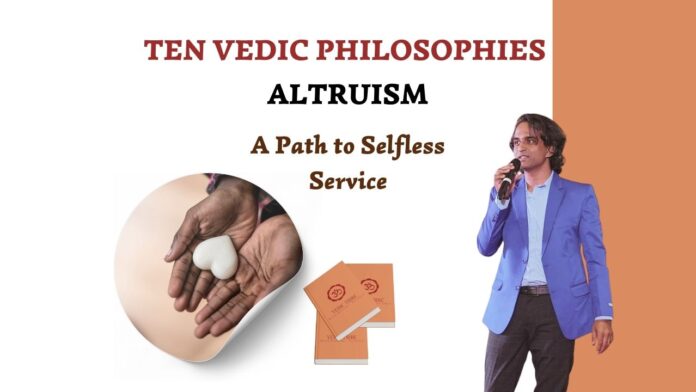Can selfless service be a spiritual practice?
In the previous article, we discussed the importance of studying philosophical ideas of Vedic Tradition and Western Philosophies. In this article, we will discuss the philosophical idea of “Altruism”.
Altruism, the selfless concern for the well-being of others, is a virtue that has been celebrated in various philosophical and spiritual traditions. While we often find ourselves caught in the cycle of self-interest, altruism offers a refreshing perspective, encouraging us to prioritize the needs of others.
In this article, we will discuss altruism in Vedic tradition and how you can turn altruism into a spiritual practice.
Altruism in Vedic Philosophy
Karma yoga: In the rich tradition of Vedic philosophy, altruism is an integral part of the spiritual journey. The concept of karma-yoga, or the path of selfless action, emphasizes the importance of performing one’s duties without attachment to the results.
Two paths to liberation: In Vedic spirituality, two major paths are shown: path of involvement in the worldly affairs (प्रवृत्ति मार्ग / pravritti marga) and the path of detachment from worldly affairs (निवृत्ति मार्ग / nivritti marga).
The risk of Pravritti-marga: In this path, it is very easy to be lured by pleasures and also to disturbed by sufferings. They drive mind of Sadhaka away from spiritual path. Hence, in Vedanta, it is suggested to adopt “altruism” so that Sadhaka can engage in worldly affair and also keep his / her trajectory in the spiritual path.
Lord Krishna’s message: The one who choses “pravritti marga” is mandated to conduct worldly activity with utmost selflessness. In Bhagavad-Gita, Krishna codifies this as “Karma-Yoga” and gives the example of King Janaka, one of the great karma-yogis.
King Janaka: The father of Ma Seeta, is a revered figure in “pravritti-marga”. He is often cited as a paragon of karma-yoga. Despite being a powerful king, he performed his royal duties with complete detachment, considering himself a servant of the people. His actions were motivated by a desire to alleviate suffering and promote the welfare of his subjects.
Embracing Altruism in Daily Life
Incorporating altruistic principles into our daily lives has a profound impact on both ourselves and the world around us. There are many ways to turn simple altruism into profound spiritual practice:
Volunteer Work: Contributing to charitable organizations or volunteering your time to help others can be a rewarding experience. When this is done as worship to almighty, you start to accumulate positive “samskara”. Samskaras are subtle impressions or tendencies that are formed in the mind as a result of our thoughts, actions, and experiences. Positive samskaras (like the one arising from altruism) create a foundation for developing positive habits. This has the power to accelerate our progress towards enlightenment.
Acts of Kindness: Small acts of kindness, like assisting a neighbour, contributing to a worthy cause, or simply lending an ear, can have a profound impact. When performing these acts, cultivating humility rather than a sense of moral superiority allows for deeper spiritual growth.
Mindful Consumption: Making conscious choices about our consumption habits, such as reducing waste and supporting ethical businesses, can have a positive impact on the environment and society. While doing so, remember that you are performing Karma-Yoga.
Practicing Gratitude: Cultivating gratitude can shift our focus from our own needs to the blessings in our lives, fostering a sense of appreciation and compassion for others. This “kritajna-bhava” keeps us grounded and prevents mind from flying away in to the realm of ego.
Meditation and Mindfulness: Regular meditation and mindfulness practices can help us develop a sense of empathy and compassion, enabling us to connect with the almighty.
By embracing altruism, we not only contribute to the well-being of others but also enrich our own lives. It is a path that leads to inner peace, fulfilment, and spiritual growth.
In the next article, we will discuss the philosophical idea Asceticism.
Madhwesh K
Vedic Tribe

